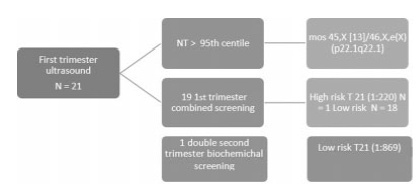Revista Brasileira de Ginecologia e Obstetrícia. 2021;43(6):452-456

The objective of the present study was to determine the frequency of malformations and chromosomal abnormalities in a population of fetuses with an aberrant right subclavian artery (ARSA).
This is a 6-year retrospective study of fetuses with a prenatal diagnosis of ARSA conducted during the period between September 2013 and June 2019 at a fetal medicine unit. Data were collected from ultrasound, fetal echocardiograms, genetic studies, and neonatal records.
An ARSA was diagnosed in 22 fetuses. An ARSA was an isolated finding in 18 out of 22 cases (82%). Associated abnormal sonographic findings were found in 4 cases. All cases underwent invasive testing. In 1 of the cases, a chromosomal abnormality was detected (mos 45,X [13]/46,X,e(X) (p22.1q22.1)). No cases of congenital heart disease were found in any of these fetuses. There were two cases in which the postnatal evaluation revealed amalformation: one case of hypospadias and 1 case of cleft palate.
The presence of an isolated ARSA is benign and is not associated with chromosomal abnormalities. The finding of ARSA, however, warrants a detailed fetal ultrasound in order to exclude major fetal abnormalities and other soft markers.
Search
Search in:


Comments